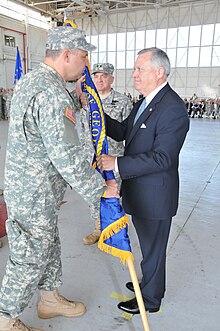Nathan Deal
John Nathan Deal (born August 25, 1942) is an American politician and former lawyer who served as the 82nd governor of Georgia from 2011 to 2019.
[1] In the general election, Deal defeated the Democratic opponent, former governor Roy Barnes, and succeeded term-limited Sonny Perdue in 2011.
Deal came to prominence in 2014 when he signed into law the Safe Carry Protection Act, known by critics as the "Guns Everywhere Law", which allows residents with a permit to carry a concealed weapon to bring firearms into most public areas, including churches, school zones, government buildings and certain sections of airports.
[9] Deal was first elected to Congress in November 1992 as a Democrat, succeeding eight-term incumbent Ed Jenkins in Georgia's 9th congressional district.
[13] The Office of Congressional Ethics released a report on March 30, 2010, that concluded Deal appeared to have improperly used his office staff to pressure Georgia officials to continue the state vehicle inspection program that generated hundreds of thousands of dollars a year for his family's auto salvage business.
The OCE does not take a position on Representative Deal's motivations for inserting himself into discussions of potential modifications to a state vehicle inspection program ...
[16][17] Although this seemed too coincidental for some, Deal maintained in a speech to supporters that the resignation was so that he could "devote [his] full energies" to the gubernatorial campaign.
[18] Before returning to Georgia to run for governor, Deal cast his final congressional vote against the Patient Protection and Affordable Care Act, also known as Obamacare.
In July 2012, Deal agreed to pay $3,350 in administrative fees to resolve violations of campaign finance and disclosure laws.
Deal was endorsed by former House Speaker Newt Gingrich, U.S. Representative Jack Kingston, and former Arkansas Governor Mike Huckabee.
[31] In the general election, Deal faced former governor and state senator Roy Barnes (D) and John Monds (L).
Barnes previously won the 1998 gubernatorial election with 52% of the vote,[32] and lost re-election in 2002 to State Senator Sonny Perdue 51%-46%.
[citation needed] After he lost re-election, he returned to practicing law for eight years until mounting a political comeback.
Barnes also tried to distance himself from Obama, saying his health care law was "the greatest failure of political leadership in my lifetime".
[41] These areas included increased funding and support for accountability courts, overhauling the juvenile justice system, and implementing prisoner re-entry initiatives.
The council's work resulted in bipartisan legislation that caused Georgia to avoid the need for 5,000 additional prison beds over 5 years and saved taxpayers at least $264 million.
[44] In addition, Deal reinvested $5 million to create a voluntary grant program that gives communities incentives to offer judges more non-confinement sentencing options.
[citation needed] With the help of the Council and the Vera Institute of Justice, Deal developed extensive performance measures to track the success of previous reforms to ensure they were enhancing public safety and saving taxpayer dollars.
"[43] On April 25, 2014, Deal announced the creation of the Governor's Interfaith Council, composed of religious leaders across Georgia, to expand upon recent criminal justice reforms.
These programs and council advisors will implement cost-effective strategies will work to increase the number of former offenders returning to the workforce and supporting their families.
[45] By removing barriers to employment, housing and education for rehabilitated offenders, a larger number of returning citizens are able to rejoin the workforce and support their families.
[50] By 2016, The Atlanta Journal-Constitution found that while 57% of Georgians believed that owning a gun protects people, 59% disapproved of the law itself.
[55] On March 28, 2016, Deal vetoed a religious liberty bill that had been passed by both houses of the Georgia State Legislature, and that had been opposed by multiple large corporations, including Salesforce.com, the Coca-Cola Company and the Home Depot.
Had Deal signed the bill into law, it would have made concealed carrying of guns legal at every public college in Georgia, so long as the carrier was 21 or older and had a proper permit.



